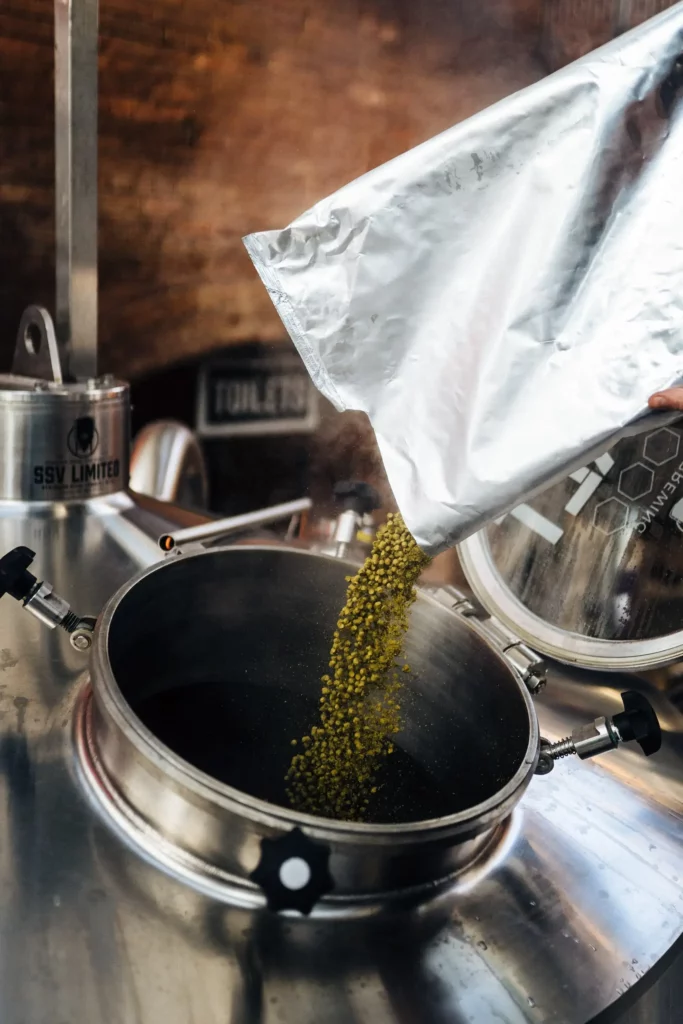Les variétés protégées de houblon envahissent le marché et les bières à la mode en usent abondamment, on vous explique ce bouleversement récent dans le paysage brassicole, et les limites de cette tendance.
IPA, Double IPA, DDH IPA, DDH NEIPA… les styles de bière houblonnés débarqués sur les becs de tirage et les rayons des cavistes ces dernières années font la part belle au houblon.
Le houblon n’est plus seulement un agent amérisant et apportant une pointe d’arôme épicés comme les styles plus classiques (Pilsner & Lager notamment). Mais développent désormais un panel d’arômes allant du fruité exotique au résineux, en passant par le fruit jaune ou fruit rouge.
Ces arômes sont apportés par l’huile essentielle.
Celle-ci contient plus de 850 composés différents : Géraniol, Myrcène, Caryophyllène, Humulène, Citranol et Limonène : certains sont fragiles et se dégradent dès que la température dépasse les 40°C. D’autres, moins nombreux, sont plus coriaces, et survivent à l’ébullition et à la fermentation.
Depuis une quinzaine d’années s’opère une course à la variété qui contiendra le plus d’huile essentielle. Les USA développent de nouvelles variétés dès les années 70 : Cascade, Comet sortent des premiers programmes de recherches fédéraux, puis Chinook, Centennial, dans les années 90. La découverte de ces nouveaux arômes citronnés, fruités, résineux est un déclencheur de la vague de bières artisanales outre-atlantique.
À partir des années 2000 sortent les désormais célèbres Citra®, Amarillo™, Simcoe®. Le rythme des sorties s‘accélère, et les USA sont rejoints par l’Australie, la Nouvelle Zélande, l’Allemagne, l’Angleterre (Nelson Sauvin™, Mandarina Bavaria, Huëll Melon, Olicanna, Pilgrim).
La France n’est pas en reste et sort quelques variétés protégées, en partie financée par l’ancêtre d’AB INBEV (Aramis, Barbe Rouge, Mistral, Elixir).

Rares sont désormais les variétés qui ne sont pas adjointes d’un “®” ou d’un “™” pour indiquer qu’il s’agit de variétés “propriétaire”.
Cela signifie que le propriétaire d’une variété, aussi appelé “obtenteur”, souvent une entreprise privée, a investi dans un programme de recherche en fonds propres, et délègue la culture à des producteurs de houblon, qui doivent respecter un cahier des charges très contraignant (surfaces importantes, dispositif de sécurité coûteux…). Il facture ainsi aux producteurs de houblon des frais de licence (royalties) pour la cultiver.
La multiplication fulgurante des variétés propriétaires ces dernières années prouvent le très bon filon qu’ont trouvé ces entreprises, qui mettent des moyens importants dans la promotion de celles-ci sur le marché, à grand renfort d’influenceurs et événements.
Les propriétaires de ces variétés verrouillent leur accès par des brevets, en plus des marques déposées. Cela en fait des variétés impossibles à cultiver…même dans votre jardin…même pour votre bière maison…
Mais si ces variétés protégées sont devenues un marqueur pour les bières de style IPA, NEIPA, DDH IPA, elles ne sont pas pour autant indispensables : Cascade, Comet, Chinook, Sorachi Ace, Lunga, Centennial sont des exemples de variétés de houblon libres, tout le monde peut s’essayer à leur culture, avec des résultats en qualité et quantité qui n’ont rien à envier aux cousins américains, ou néo-zélandais !
Pour vous aider à choisir une variété adaptée à vos envies, visitez le moteur de recherche houblon www.listehoublon.fr